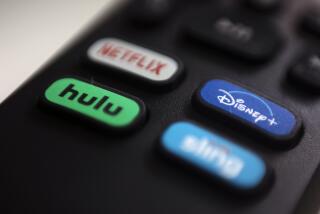HBO to offer its programming over the Internet

In a blow to cable and satellite TV providers, HBO will offer its programs directly to consumers over the Internet — potentially giving millions more Americans another reason to cancel their pay TV service.
The premium network — home to “Game of Thrones,” “Boardwalk Empire,” “True Blood” and other shows — is now available only to pay TV customers for a subscription of about $15 a month. Starting next year, HBO will be available a la carte to the 70 million households with basic cable or satellite service, and to the estimated 10 million households with high-speed internet but no pay TV service at all.
Because HBO has some of the most sought-after programs on television, its decision is expected to accelerate the dismantling of bundled pay TV channel packages in which households pay for a wide range of programming, even for channels they never watch.
It could also force pay TV companies to offer slimmer custom packages of channels, at lower price points, to better meet consumer demand.
“This is the tipping point — and the beginning of real change coming to television,” said Jeffrey Cole, director of USC’s Center for the Digital Future. “This is a big problem for the Comcast, Time Warner Cable, DirecTV and AT&T’s U-Verse of the world. Cable as it exists now will have to change.”
Younger viewers, in particular, increasingly stream the shows they want to see over the Internet to avoid monthly pay TV bills that can top $100 a month.
“If I could keep HBO and Showtime, I would have no need for Time Warner Cable,” said Kyle Cummings, a 33-year-old graphic designer who lives in Los Feliz. “I love TV and want to get everything I want when I want to watch it, and I don’t want to pay $200 a month for 75 ESPNs [channels] I will never watch.”
HBO announced its plans at a presentation in New York for investors of parent company Time Warner Inc. The pivot startled Wall Street analysts, who expressed concern that making a streaming service widely available would encourage more people to cut the cord on their pay TV subscriptions.
But evidence has been mounting that consumers already are ditching their subscriptions or shaving channels in an effort to trim expenses. Some estimates place the number of subscribers who have dropped pay-TV service as high as 7 million homes.
“This was the move that all of the pay-TV companies have been nervously holding their breaths for — and hoping would never come,” said James McQuivey, an analyst with Forrester Research. “But the move by HBO was inevitable from the moment that people started streaming TV shows online.”
HBO has long been considered part of the glue that holds the pay-TV packages together.
In the past, HBO executives dismissed such suggestions that it offer a streaming service because HBO and its sister channel Cinemax collect nearly $4 billion a year in fees from pay-TV operators, providing the unit with its largest source of income. About 46 million homes in the U.S. have either HBO, Cinemax or both.
HBO’s hand was forced, in part, by the success of independent streaming services Netflix and Amazon.com. This summer, Netflix edged past HBO in total number of U.S. subscribers and is rapidly expanding internationally. Netflix and Amazon are also ramping up their original programming, with Netflix reaping Emmys and critical accolades for shows such as “House of Cards” and “Orange Is the New Black.”
HBO said there would be a large market for its product. Currently, about 70 million households have basic cable or satellite service without opting for HBO. An additional 10 million households have high-speed Internet but no pay TV service at all.
“That is a large and growing opportunity that should no longer be left untapped,” HBO Chief Executive Richard Plepler told investors. “It is time to remove all barriers to those who want HBO.”
Netflix, which is seen as HBO’s biggest competitor, said it welcomed the increased competition.
“It was inevitable and sensible that they would eventually offer their service as a standalone application,” Netflix said in a statement. “Many people will subscribe to both Netflix and HBO since we have different shows, so we think it is likely we both prosper as consumers move to Internet TV.”
Representatives of the major pay TV services — including DirecTV, Time Warner Cable and Comcast — declined to comment.
Time Warner Chief Executive Jeff Bewkes acknowledged that the TV industry has been slow to respond to the Netflix, Amazon and Hulu, and to changes in consumer behavior. He said that he has spent five years prodding cable and satellite TV companies to make easy-to-use streaming applications available to their customers in an effort to keep up with the changes in consumer viewing behavior.
But pay TV companies were fearful that such options would encourage people to cancel their subscriptions.
“The technology world turned it on faster and better” than the TV industry, Bewkes said. “We are saying, ‘Let’s get [the content] out there.’”
HBO did not say precisely when next year the Internet streaming service would be rolled out or how much it planned to charge for it. The service will probably cost $13 to $16 a month, industry analysts said.
Plepler said the new service would generate hundreds of millions of dollars in additional revenue for HBO’s already healthy bottom line. Last year, HBO turned a profit of $1.8 billion.
That’s partly because HBO splits about half its monthly subscription fees with pay-TV operators — something it won’t have to do for subscriptions it sells directly to consumers. The network could collect more money than it currently does from individual subscribers if it charged $12 a month, analysts said.
HBO has been working on its Internet streaming product for about five years and has established engineering centers in New York City and Seattle. In 2011 it introduced its HBO Go mobile application, which enables subscribers to view programming on mobile phones and tablets. But it resisted until now because it didn’t want to ruffle the feathers of its important distribution partners.
The new initiative will require HBO to establish call centers and a billing system because it now relies on pay TV operators to promote its networks. The company also said it planned its own marketing push, which will roll out next year.
HBO already offers a standalone streaming service, HBO Nordic, to residents of four countries: Sweden, Denmark, Finland and Norway. Consumers in those countries have the option of subscribing to an HBO streaming service, which costs about $10 a month, or the old-fashioned way as a premium channel as part of their cable package.
Plepler said HBO wanted to work with its current partners — the pay TV distributors — to provide the service to consumers. That might mean that HBO would continue to partner with such cable companies as Comcast, which already offers its customers a $50-a-month Internet-Plus offering that includes about two dozen TV channels, including HBO.
The move comes as distributors have offered lower-priced packages. In addition, satellite giant Dish Network and entertainment company Sony plan to roll out Internet streaming services that will offer a package of TV channels for about $30 to $40 a month.
Cable companies for the last five years have recognized that the future lies in the high-margin high-speed Internet service.
To survive, these companies have put more emphasis on selling bundles of service, which include TV channels, phone service and Internet.
Follow me on Twitter: @MegJamesLAT
Follow me on Twitter: @rfaughnder
More to Read
From the Oscars to the Emmys.
Get the Envelope newsletter for exclusive awards season coverage, behind-the-scenes stories from the Envelope podcast and columnist Glenn Whipp’s must-read analysis.
You may occasionally receive promotional content from the Los Angeles Times.









